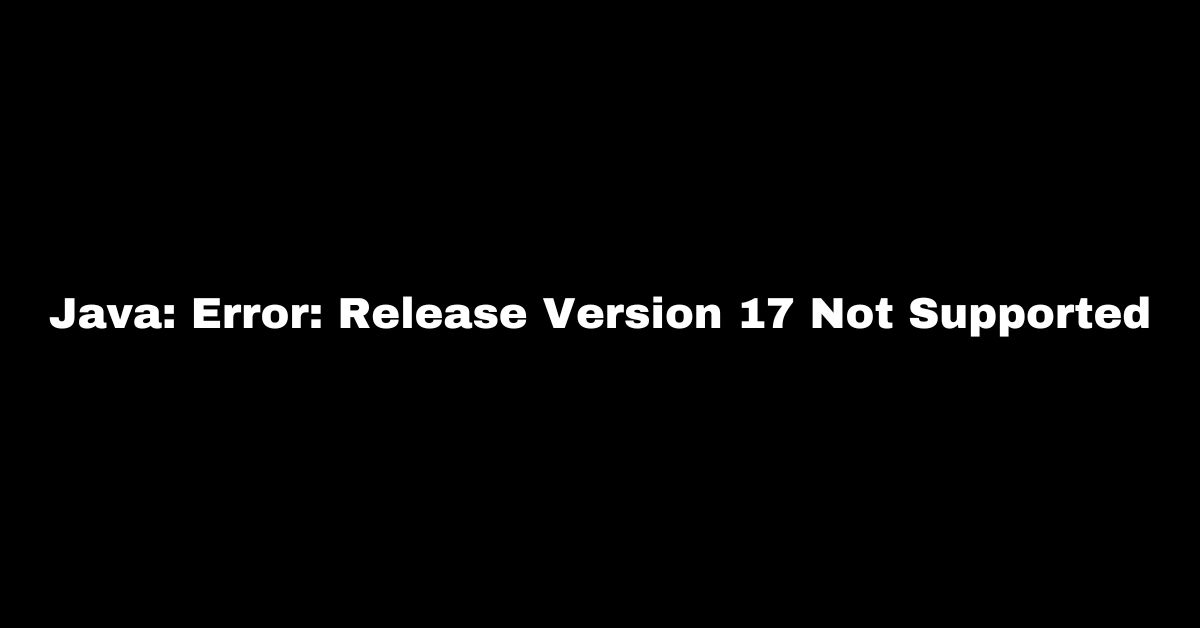Java, a versatile and widely used programming language, continually evolves with new versions to enhance performance, security, and features. Each version brings improvements, but sometimes, users encounter errors like “Java: Error: Release Version 17 Not Supported.” In this article, we will explore the causes of this issue and guide you on resolving it effectively.
1. Introduction to Java and its Versions
Java is a prominent programming language known for its versatility, portability, and platform independence. Oracle Corporation, along with the community, regularly releases new versions of Java, introducing enhancements and fixing bugs.
2. Understanding Release Versions in Java
Java versions are designated by numbers (e.g., Java 8, Java 11, Java 17). These versions signify significant updates, with odd numbers representing short-term support (STS) releases and even numbers representing long-term support (LTS) releases.
3. The Significance of Java 17
Java 17, an LTS release, is a crucial update, bringing performance enhancements, new features, and improved security to the language. It offers a range of benefits for developers and users alike.
4. The Error Message: “Java: Error: Release Version 17 Not Supported”
Encountering the error “Java: Error: Release Version 17 Not Supported” indicates that the current Java version is incompatible or not supported by the system or application you are using.
5. Possible Causes of the Error
Several factors can lead to this error, including an outdated Java version, incorrect environment configurations, or system incompatibilities.
6. How to Address the Error
To resolve this error, follow these steps:
7. Checking System Requirements
Ensure that your system meets the requirements for Java 17.
8. Updating Java to a Supported Version
Update your Java installation to a version that supports release 17.
9. Checking Environment Variables
Verify the correctness of environment variables related to Java.
10. Verifying the JDK Installation
Ensure that the Java Development Kit (JDK) is correctly installed.
11. Common Pitfalls and Misconfigurations
Avoid common mistakes during the setup and configuration of Java.
12. Seek Community Support and Forums
Engage with the Java community to seek help and guidance on resolving the error.
13. Exploring Alternative Solutions
Consider alternative solutions if the error persists.
14. Conclusion Summarizing the Error and Solutions
In conclusion, encountering the “Java: Error: Release Version 17 Not Supported” error is solvable by understanding the system requirements, updating Java, and verifying configurations. Java 17 is a powerful version that warrants a smooth user experience when correctly installed.
15. Frequently Asked Questions (FAQs)
Q1: Can I use older versions of Java with the same application?
Yes, depending on the application’s compatibility, you can use supported older versions of Java.
Q2: How often are new Java versions released?
Java versions are usually released every six months, with LTS versions released every three years.
Q3: Can I install multiple versions of Java on my system?
Yes, you can have multiple Java versions installed, but ensure they do not conflict and are compatible with your applications.
Q4: What are the benefits of upgrading to Java 17?
Java 17 offers enhanced performance, new language features, and improved security, among other benefits.
Q5: Where can I download different versions of Java?
You can download Java versions from the official Oracle website or other trusted sources.




